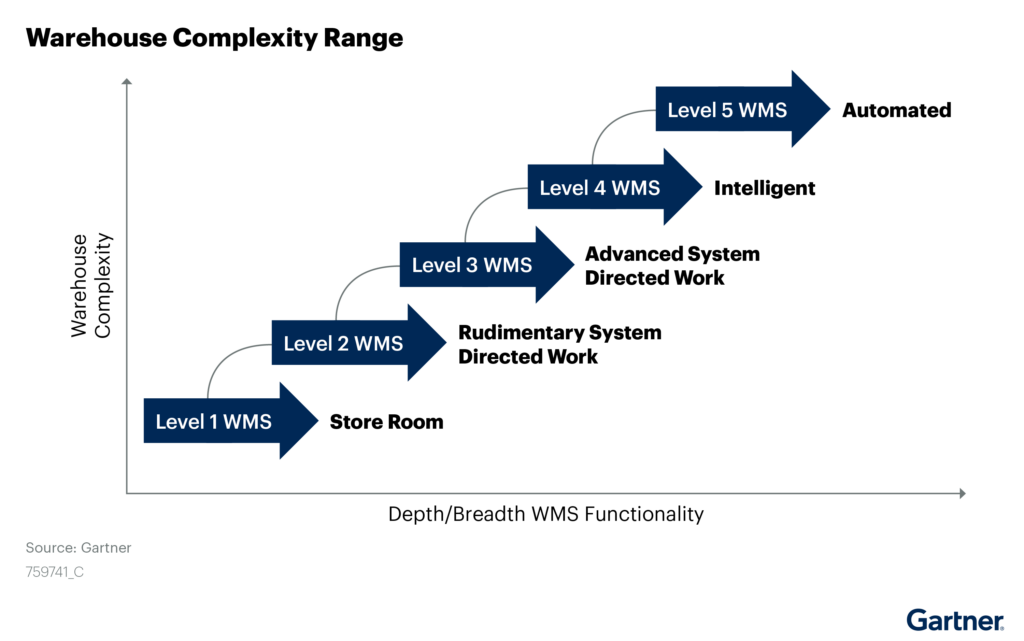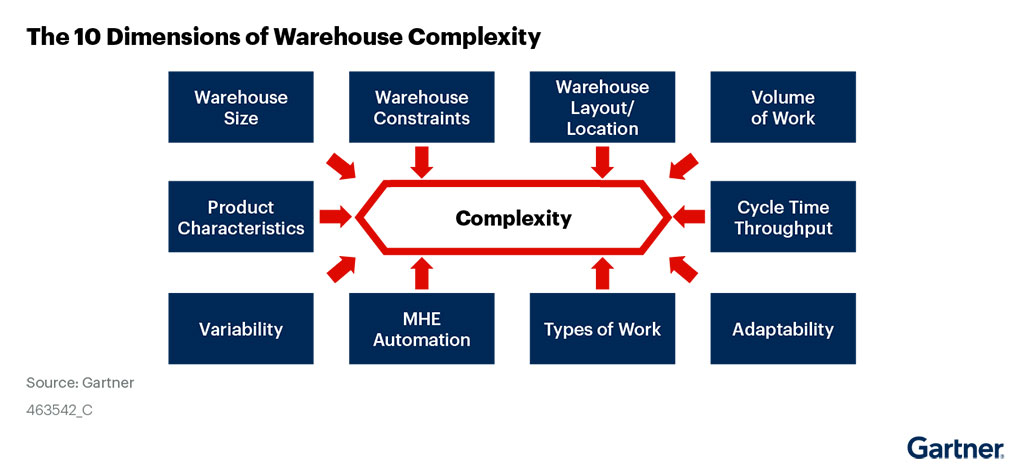It’s never been more crucial in today’s oversaturated marketplace to take advantage of every tool at your disposal to leverage your operation as one of the best in the field. Moreover, consumers have access to vendors and services virtually anywhere in the world offering many types of warehouse management systems.
To stay competitive and profitable, you need to ensure your operations are ironclad, alleviating any issues with order fulfillment or the supply chain well before affecting sales. You can do that with a highly trained team of specialists working around the clock to keep close tabs on inventory as it comes in and goes out using an ever-updating system of spreadsheets and constant communication.
Or, you know, you could use warehouse management software (WMS) that automates most of these critical processes and allows the entire organization to keep close tabs on what’s happening.
What Are WMS Solutions?
Today, some independent stores and services operate from one location, but they’re a rare breed these days. More often, stores and organizations are a series of stores, sometimes having no physical stores and taking full advantage of today’s Internet-based interconnected marketplace in a purely digital sense. It only makes sense that our increasingly digital world would create digital solutions to manage the size and speed of today’s marketplace, and that’s where warehouse management systems come into play.
WMS solutions allow individuals at all levels of the organization, upper management, warehouse, on-site sales, and more to keep an eye on inventory and ordering. However, instead of relying solely on the word and oversight of a few select individuals, the system instantly communicates information, as it’s accessible from any Internet-enabled device, including smartphones.
This software allows the organization to monitor inventory in real-time to set realistic customer expectations, manage order fulfillment processes, and identify problems before they become actual problems that affect sales.
Types Of Warehouse Management Software
What warehouse management software seeks to accomplish is generally the same, but how it achieves the task may vary depending on the type of WMS solution used. Here are the different types of WMS solutions you could incorporate into your organization.
Integrated WMS
If you’re running a modern organization, chances are you are already using a program, or several different programs, to keep things organized and keep a close eye on the performance of the organization at any given moment in time. It could be custom CRM software, ERP software, or any other pertinent software solution that streamlines and simplifies your business operations.

View Case Study
If you’re already using some kind of software to keep tabs on things, why onboard your whole company onto yet another platform? That’s where integrated WMS comes in. Integrated WMS adds to existing platforms, which is immensely useful. For one, there’s less of a learning curve. The warehouse management software becomes just an extension of a system you were already using, making it intuitive and easy to pick up.
In addition, all the company data stored in one place is auto-integrated into your WMS. You lose less time and leave less room for error by having everything in one place. What’s more, the existing metrics your ERP or CRM was tracking for you will now be integrated with the WMS data. You now have a bigger picture of the whole operation from one handy program.
Sure, that’s convenient, but it’s more than that. Having invoicing, accounting, and inventory tracking alongside materials management and profit margin is a powerful thing. Upper management and other decision makers now get a snapshot of financial analytics related to actual inventory, sales, and margins.
Now it is possible to make tweaks that will lead to a bigger profit margin and greater bottom line, all thanks to your WMS.
Standalone WMS
The opposite of integrated WMS is standalone. There are some immediate cons to this model. For one, it is now another desktop icon, login, and UI for employees to wrap their brains around, so there is more learning curve associated than integrated WMS.
In addition, you may need to export some data to your WMS or look at different datasets in different places. This could be cumbersome in practice and cost you time. However, you can partially remedy it by simply having two monitors.
Where standalone WMS shines is that the experience generally has more depth. You get more features, power, and abilities to manage the inventory, order fulfillment, and monitor all stages of the supply chain.
Standalone WMS may also feature advanced reporting that is not available on integrated versions of similar software. The figures presented in these reports may be crucial to bringing your operation to the next level and, of course, realizing greater gains.
Integrated and standalone are both viable options. What works best for you will be a personal decision.
On-Premises WMS
On-premises WMS is exactly what it sounds like. The overhead costs associated with purchasing, maintaining, and operating hardware and software that WMS needs to run will fall on you. In addition, it will be you or your in-house IT team diagnosing and troubleshooting problems, which could present obstacles to overcome.
However, one big upside to this model is that you retain full control of the hardware and security. You can choose top-of-the-line computer systems that boot fast and run at lightning-fast speeds. You get to select the security system, whether it be a firewall, VPN, or some combination. Finally, you get to decide how that data is backed up, whether you want a backup power supply in the event of outages, an external one that regularly stores company data, or something else entirely.
On-premises WMS gives you full control of various operational aspects of the system.
Cloud-Based WMS
One of the wonderful things about this day and age is that the need to manually back things up is generally obsolete. It can be done by old-school or traditional folks that remember a time fondly when floppy disks were the standard.
Thankfully, the cloud makes things way easier. Cloud-Based WMS solutions back everything up on the cloud, so everything is safe in case of a power failure or other unforeseen mishap. It also means that employees from virtually anywhere will have access immediately, with no need to set up a separate remote login client for them to use.
What’s more is that all IT, troubleshooting, and problem-solving no longer needs to be your problem or the problem of your staff. Instead, a dedicated team provided by the developers of the warehouse management software will be available to ensure the program runs as it should. So whenever there is a problem, it is only a phone call or a live chat to get it back in order.
Everything is simple and easy, but it comes at a cost. Cloud-based warehouse management software often requires a subscription and corresponding fee. However, since the software will allow the owner or vendor to realize profits they otherwise might not tap, the pros often far outweigh the cons.
What’s The Best WMS Solution For My Organization?
Of course, the answer to which WMS solution works best for your purposes will depend on various factors.
Functions & Processes That Could Be Improved With Automations
Organizations that already have several programs in play or a less technologically adept workforce may lean towards an integrated WMS since it will essentially become an add-on to platforms they are already accustomed to. The integrated application will be less extensive than the standalone counterpart, but it is nonetheless powerful software that will allow employees at all hierarchies of the organization to improve productivity.
Organizations with minimal technological integration at this time might feel fine onboarding their team to a new system, and doing so will give them access to various features and advanced metrics that an integrated model may lack. Acquiring this software may be the first step to modernizing antiquated business models and getting the company back into good standing in today’s modern workplace.

In order to attain a strong understanding of which warehouse processes and functions could be improved through automations, Figure 3.1 describes the current levels of automations that currently exist within five levels.
The Overall Complexity Of Warehouse Operations
Smaller operations that don’t need a vast network of employees and executives looking in on the numbers regularly may be fine with on-premises WMS. Some larger organizations may have a remote work hub set up already as well, which addresses the need to check WMS remotely via the cloud.
Likewise, larger organizations with hundreds or thousands of employees across different offices in various locations worldwide may need something quick, convenient, and accessible from anywhere. For these organizations, the cloud-based WMS is a winning solution.

In Figure 3.2, the complexity of operations within the warehouse can be determined by ten important dimensions. The optimal warehouse management software should be decided upon the level of strength within each of the ten dimensions outlined.
Reach Out To The Custom WMS Solution Developers Today
Orases develops custom software to deliver solutions to your organization and give your organization a competitive edge. Today’s marketplace is saturated with competitors, and business moves fast. Therefore, you need solutions tailored to you to keep ahead of the curve and ahead of the pack.
Orases has a client-focused approach that helps you determine your organization’s priorities and goals, as well as what information and data is most important to keep front and center to fully optimize the company’s performance. Then, taking your input, the custom software development team at Orases will build a unique business management platform that works for your company. Start your custom warehouse management software today by calling 301.756.5527 or by scheduling a consultation online today!




